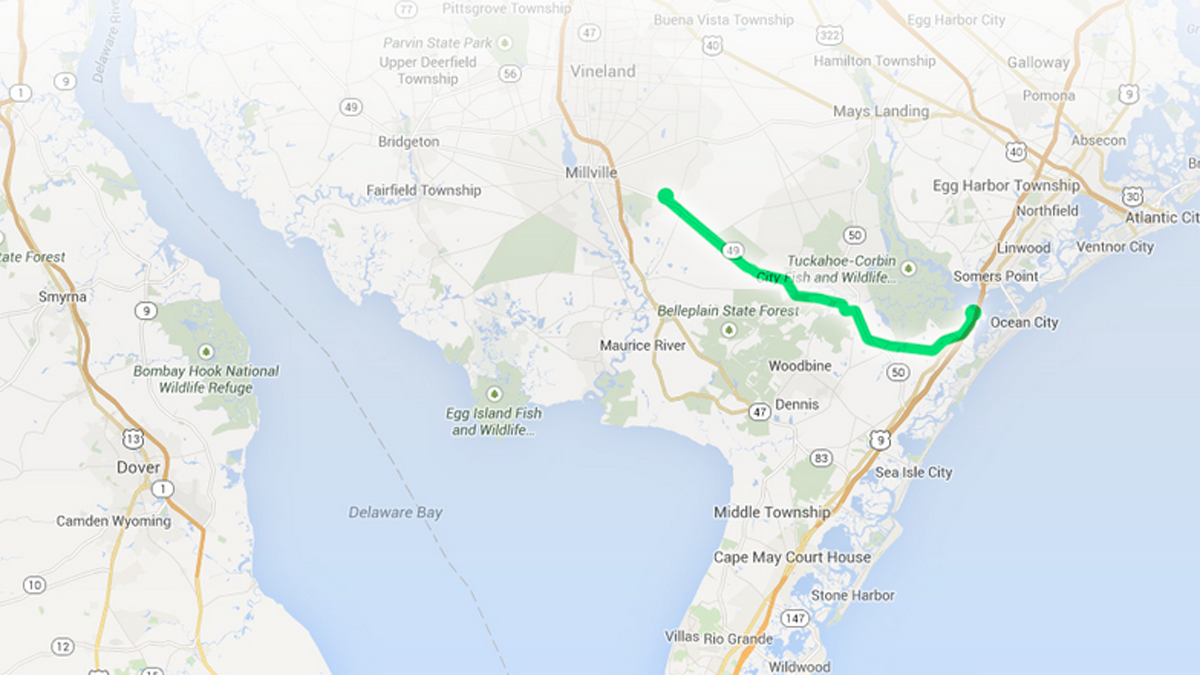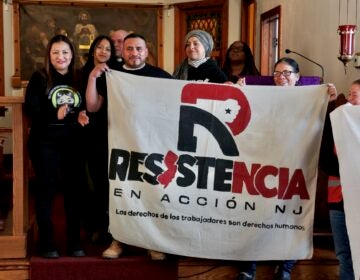Pipeline application approval by Pinelands Commission chief raises eyebrows [map]
Listen
A view of the proposed pipeline which would run along and beneath Routes 49 and 50 in New Jersey. (Map courtesy of capeatlanticreliability.com)
During a regularly scheduled meeting of New Jersey’s Pinelands Commission on Friday, executive director Nancy Wittenberg issued a “certificate of filing” for a natural gas pipeline proposed by South Jersey Gas. What sounds like a humdrum motion in the gears of bureaucracy actually raised a lot of eyebrows across the Garden State, because it means the project will not go up for a vote before the commission’s 15-member board.
During a regularly scheduled meeting of New Jersey’s Pinelands Commission Friday, executive director Nancy Wittenberg issued a “certificate of filing” for a natural gas pipeline proposed by South Jersey Gas.
Running from Maurice River Township in Cumberland County to Upper Township in Cape May County and cutting through the southern end of the Pinelands, the proposed pipeline would deliver natural gas to the B.L. England power plant, which plans to stop burning coal within several years.
What sounds like a humdrum motion in the gears of bureaucracy actually raised a lot of eyebrows across the Garden State, because it means the project will not go up for a vote before the commission’s 15-member board.
To understand how that works means delving into the often complex rules of the Pinelands Commission, the state agency formed to oversee the 1.1-million-acre protected natural reserve.
The rules say that any infrastructure project built in the Pinelands must primarily serve the needs of the residents who live there.
When South Jersey Gas submitted its proposal in 2013, it applied for an exception to that rule (a “memorandum of agreement”), which required a vote from the 15 commissioners. The commission deadlocked at 7-7, killing the plan.
After South Jersey Gas submitted a revised application this year with more information about how the pipeline would serve local residents and act as a backup power supply, the commission’s staff changed its tone and approved the application.
“Based on our review of the application, including newly submitted information, materials in the record and the review of prior applications, the applicant has demonstrated that the proposed gas main is consistent with the permitted use standards of the [Pinelands Comprehensive Management Plan],” said the commission in a written statement, after declining several interview requests.
Although it’s not the last word from the Pinelands Commission, as long as the pertinent municipalities or the state Board of Public Utilities approve the pipeline proposal in its current form, the commission will give its official signoff too.
While the Pinelands Commission says this is how the process always goes for private applications, others across the state questioned the move.
“The Pinelands Commission was never like this before,” said Carleton Montgomery, executive director of the Pinelands Preservation Alliance.
 A closer look at the proposed pipeline’s pathway, which would run along and beneath Routes 49 and 50. (Map courtesy of sjindustry.com)
A closer look at the proposed pipeline’s pathway, which would run along and beneath Routes 49 and 50. (Map courtesy of sjindustry.com)
According to Montgomery, the commission has recently become more attentive to political power brokers, with the staff bending the rules in favor of the state’s business interests.
“This is an evolution in the life of the Pinelands Commission that we really hope will be reversed, that we can get the Pinelands Commission back to where it was, where it was a very solid, bipartisan, consistent agency, where you might not like the rules but you knew what they were,” Montgomery said.
Still others worried about the lack of transparency in a behind-the-scenes decision by the Pinelands Commission staff that the South Jersey Gas application jibed with all the commission’s rules.
“Quite frankly, this is the same pipeline on the same route, and to cut out the Pinelands Commission and the public just is unconscionable,” said Doug O’Malley, director of Environment New Jersey.
A representative for South Jersey Gas also declined an interview, but said in a statement that “[t]his important project will enhance the area’s access to safe and reliable energy by providing cleaner natural gas to convert a coal-fired power plant and improve reliability for 142,000 natural gas customers in Cape May and Atlantic Counties. We will follow the process laid out in the certificate as we move toward completion of the project.”
WHYY is your source for fact-based, in-depth journalism and information. As a nonprofit organization, we rely on financial support from readers like you. Please give today.




